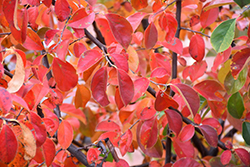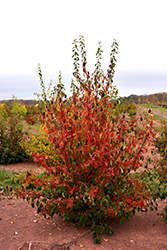It's all about ...
plants

Height: 20 feet
Spread: 10 feet
Sunlight:
![]()
![]()
Hardiness Zone: 6a
Description:
A small tree or large shrub with a dense oval crown; shiny dark green leaves turn yellow-red in the fall; fragrant pink flowers in spring are followed by large, edible oval fruits which ripen in fall; peeling bark reveals a patchwork of color
Ornamental Features
Chinese Quince is bathed in stunning fragrant shell pink cup-shaped flowers along the branches in mid spring, which emerge from distinctive rose flower buds. The fruits are showy yellow pomes carried in abundance from early summer to early fall. The fruit can be messy if allowed to drop on the lawn or walkways, and may require occasional clean-up. It has forest green deciduous foliage. The serrated oval leaves turn outstanding shades of yellow, orange and red in the fall. The peeling grayish green bark is extremely showy and adds significant winter interest.
This plant is primarily grown as an ornamental, but it's also valued for its edible qualities. The large oval tart fruit is most often used in the following ways:
- Cooking
- Baking
- Preserves
- Sauces
Landscape Attributes
Chinese Quince is a multi-stemmed deciduous tree with a shapely oval form. Its average texture blends into the landscape, but can be balanced by one or two finer or coarser trees or shrubs for an effective composition.
This tree will require occasional maintenance and upkeep, and may require the occasional pruning to look its best. It is a good choice for attracting birds and bees to your yard. Gardeners should be aware of the following characteristic(s) that may warrant special consideration;
- Messy
- Disease
Chinese Quince is recommended for the following landscape applications;
- Accent
- Hedges/Screening
- Orchard/Edible Landscaping
Planting & Growing
Chinese Quince will grow to be about 20 feet tall at maturity, with a spread of 10 feet. It has a low canopy with a typical clearance of 2 feet from the ground, and is suitable for planting under power lines. It grows at a slow rate, and under ideal conditions can be expected to live for 40 years or more. This is a self-pollinating variety, so it doesn't require a second plant nearby to set fruit.
This tree does best in full sun to partial shade. It prefers to grow in average to moist conditions, and shouldn't be allowed to dry out. It is not particular as to soil type, but has a definite preference for acidic soils. It is somewhat tolerant of urban pollution. This species is not originally from North America..
This plant is not reliably hardy in our region, and certain restrictions may apply; contact the store for more information.

